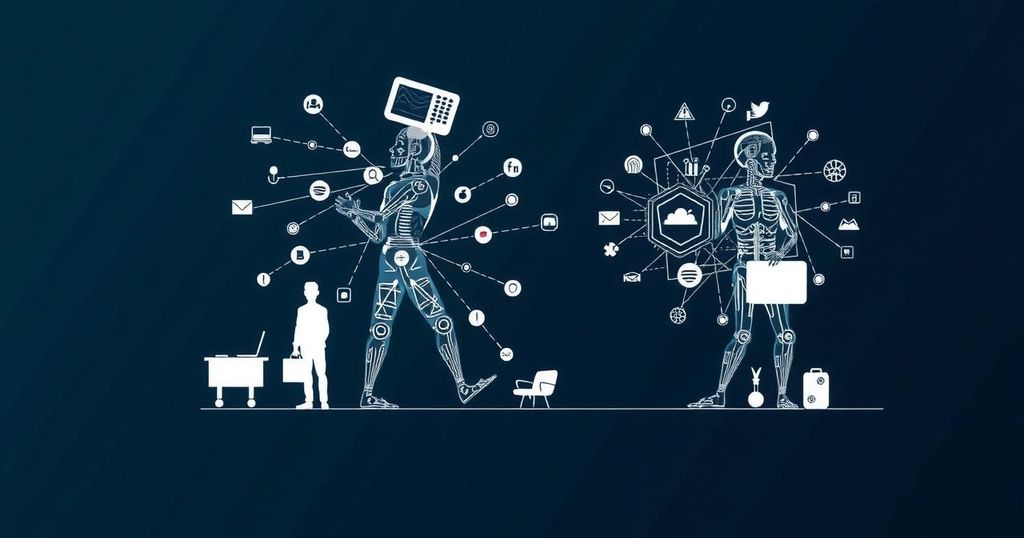Summary
A report from CompTIA identifies the challenges companies face in integrating AI tools while maintaining human talent effectiveness. Key issues include balancing AI with workforce skills, rising tech costs, and cybersecurity. The report outlines a skills framework essential for AI implementation, emphasizing HR’s critical role in strategic planning to optimize outcomes and ensure inclusivity as businesses move toward greater AI adoption.
A recent report from CompTIA highlights the complexities faced by companies in integrating artificial intelligence (AI) within their operations while maintaining a productive partnership with human talent. The research, released on August 28, surveyed over 500 tech industry professionals and identified a significant challenge in achieving a harmonious coexistence between AI tools and human contributions. The report also emphasized additional barriers such as escalating costs associated with technology infrastructure, cybersecurity vulnerabilities, and privacy concerns. To mitigate these challenges, organizations are increasingly focusing on skill development as an essential component of their strategy to enhance AI capabilities in customer relationship management, business productivity, and human resources systems. Seth Robinson, Vice President of Industry Research at CompTIA, stated, “These tools are already integral parts of corporate workflow, and AI will become a powerful new part of a complex solution stack.” He elaborated that businesses will likely need a broad foundation of AI knowledge across their workforce, while specialized expertise will be pivotal in select sectors. In response to the evolving landscape of AI implementation, CompTIA has established a six-domain AI skills framework to foster skill development: 1. Cybersecurity: Incorporating AI functionalities to bolster network security. 2. Auto Coding: Implementing AI in software development processes, complementing human coders. 3. Architecting: Enabling human professionals to design and build AI infrastructures. 4. Tech-Adjacent Work: Ensuring staff members are equipped with the best practices for AI prompts. 5. Data Analytics: Evolving analytics practices in concert with AI advancements. 6. System Operations: Enhancing automation in business processes through AI integration. Peter Hirst from the MIT Sloan School of Management asserts that learning and development (L&D) initiatives should prioritize human capital during this transformation. He points out that the potential for innovation presented by AI also comes with significant risks that necessitate human resource (HR) involvement in training and capacity enhancement efforts. Despite this, a report by McLean & Co. concluded that HR departments are frequently excluded from AI strategic discussions, which could lead to missed opportunities for effective change management and organizational improvement. HR leaders must be included in formulating strategic AI implementation frameworks to maximize return on investment and safeguard against risks pertaining to reputation and inclusivity. A report by Mercer reflects the prevailing uncertainty among talent leaders about AI’s role in the workplace as organizations look toward 2024. It underscores the importance of redesigning work dynamics to effectively integrate AI and automation. It indicates that high-performing executive teams excel in their adoption of AI by fostering a culture focused on human-centric productivity, ensuring trust, advocating for equitable practices, and embracing a future enriched by digital innovations.
The integration of artificial intelligence into business processes is becoming increasingly vital as organizations look to enhance efficiency and productivity. However, balancing the operational advantages of AI with the irreplaceable contributions of human talent presents a significant challenge. This dynamic necessitates a focus on reskilling and upskilling the workforce to leverage AI’s potential effectively while addressing concerns such as cybersecurity and infrastructure investments. Understanding the emerging skill requirements and the strategic involvement of HR departments is crucial for successful AI implementation.
In summary, the integration of AI tools in conjunction with human talent represents a multifaceted challenge for contemporary organizations. The CompTIA report underscores the need for comprehensive skill development across various domains to achieve a successful interplay between human capabilities and AI technologies. Moreover, the active involvement of HR in crafting strategic plans for AI implementation is essential to ensure the protection of organizational integrity and the promotion of inclusive practices. As companies look toward the future, prioritizing a human-centric approach will be vital to fully realize AI’s transformative potential in the workplace.
Original Source: www.hrdive.com

Leave a Reply